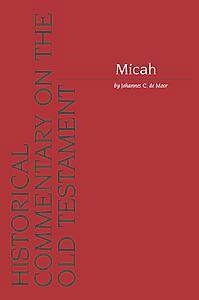
Je cadeautjes zeker op tijd in huis hebben voor de feestdagen? Kom langs in onze winkels en vind het perfecte geschenk!
- Afhalen na 1 uur in een winkel met voorraad
- Gratis thuislevering in België vanaf € 30
- Ruim aanbod met 7 miljoen producten
Je cadeautjes zeker op tijd in huis hebben voor de feestdagen? Kom langs in onze winkels en vind het perfecte geschenk!
- Afhalen na 1 uur in een winkel met voorraad
- Gratis thuislevering in België vanaf € 30
- Ruim aanbod met 7 miljoen producten
Zoeken
€ 161,45
+ 322 punten
Omschrijving
The book of Micah provides insight into the struggle of a prophet with his vocation in an extremely difficult time. The aggressive policies of Neo-Assyrian kings which involved large-scale destruction, deportation and resettlement upturned existing social structures everywhere. Kings of Judah like Ahaz and Hezekiah had to compromise with the enemy to retain their position. Micah denounced their overindulgence. Initially, the results of his efforts were disappointing and one may certainly say that Micah was a tragic figure who towards the end of his life felt he had been a failed prophet. It is no coincidence that in the Hebrew Bible Micah 3:12 occupies the middle of the whole book of the Twelve "Minor" Prophets. In this verse Micah courageously announced the destruction of the temple on Zion because of Jerusalem's sins -- more than a hundred years before it actually happened. His contemporaries had ridiculed him because they did not believe God would ever allow the destruction of his holy abode. Whistleblowers are never popular and it is possible that Micah has had to pay with his life for his scathing criticism of the authorities. However, history proved him right and Micah's impressive sermons inspired later generations to complement them with consoling messages of forgiveness and hope. Prophecy, also prophecy outside Israel, was always open to future expansion. In this way the book of Micah became a cherished source of messianic expectations among both Jews and Christians. Modern research into the book of Micah denies him the authorship of more than half of the chapters attributed to him. On the basis of new textual and archaeological data from the entire Ancient Near East this commentary argues that much more can be regarded as actual fire-and-brimstone preaching of the historical prophet Micah. This conclusion was achieved among other things by collating more than a hundred Hebrew manuscripts of the book of Micah. The commentary devotes also much attention to geology, climate, flora, fauna, agriculture and art. Fifty illustrations elucidate these realia.
Specificaties
Betrokkenen
- Auteur(s):
- Uitgeverij:
Inhoud
- Aantal bladzijden:
- 470
- Taal:
- Engels
- Reeks:
Eigenschappen
- Productcode (EAN):
- 9789042943636
- Verschijningsdatum:
- 30/10/2020
- Uitvoering:
- Paperback
- Formaat:
- Trade paperback (VS)
- Afmetingen:
- 156 mm x 240 mm
- Gewicht:
- 739 g

Alleen bij Standaard Boekhandel
+ 322 punten op je klantenkaart van Standaard Boekhandel
Beoordelingen
We publiceren alleen reviews die voldoen aan de voorwaarden voor reviews. Bekijk onze voorwaarden voor reviews.









